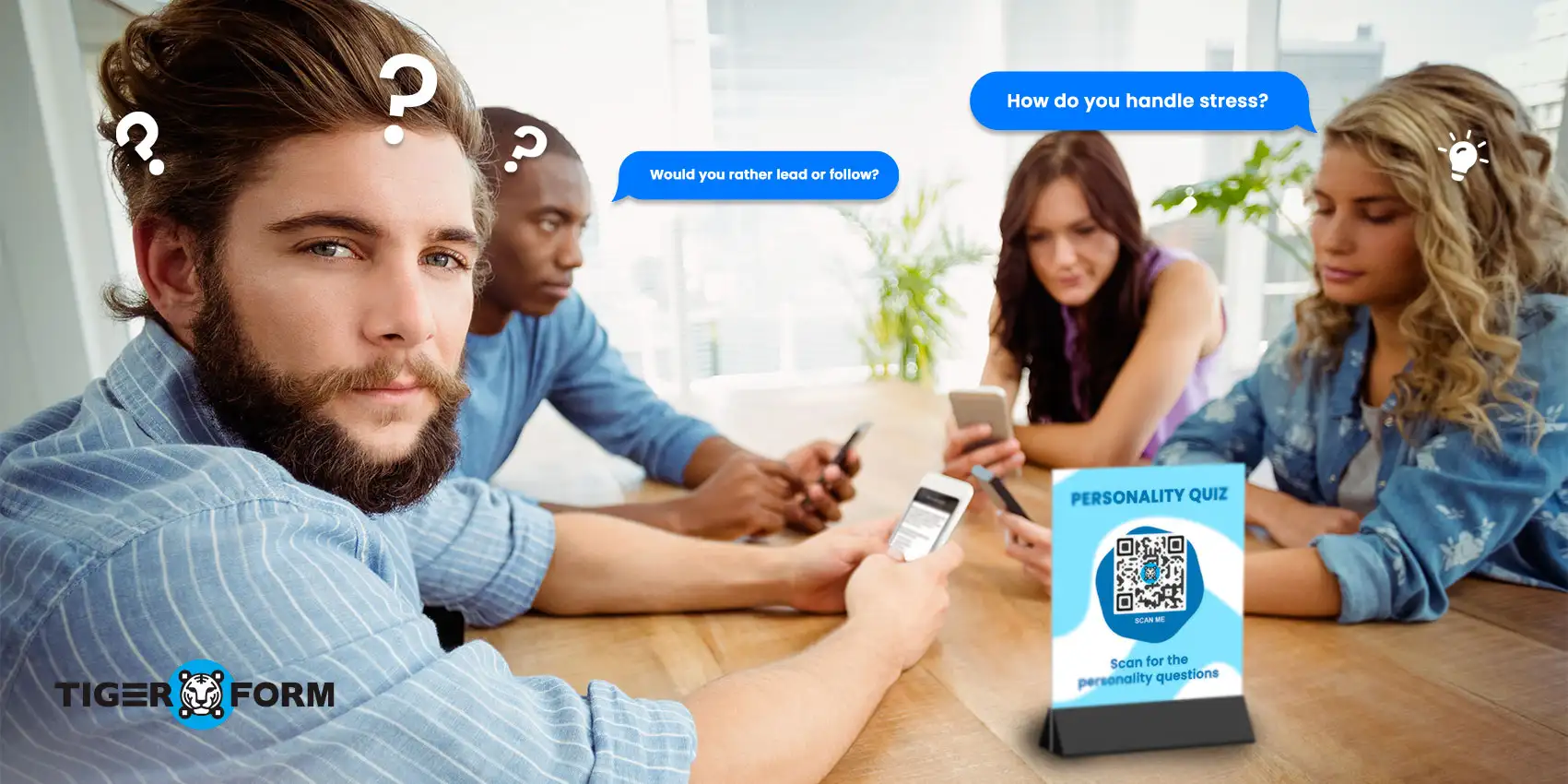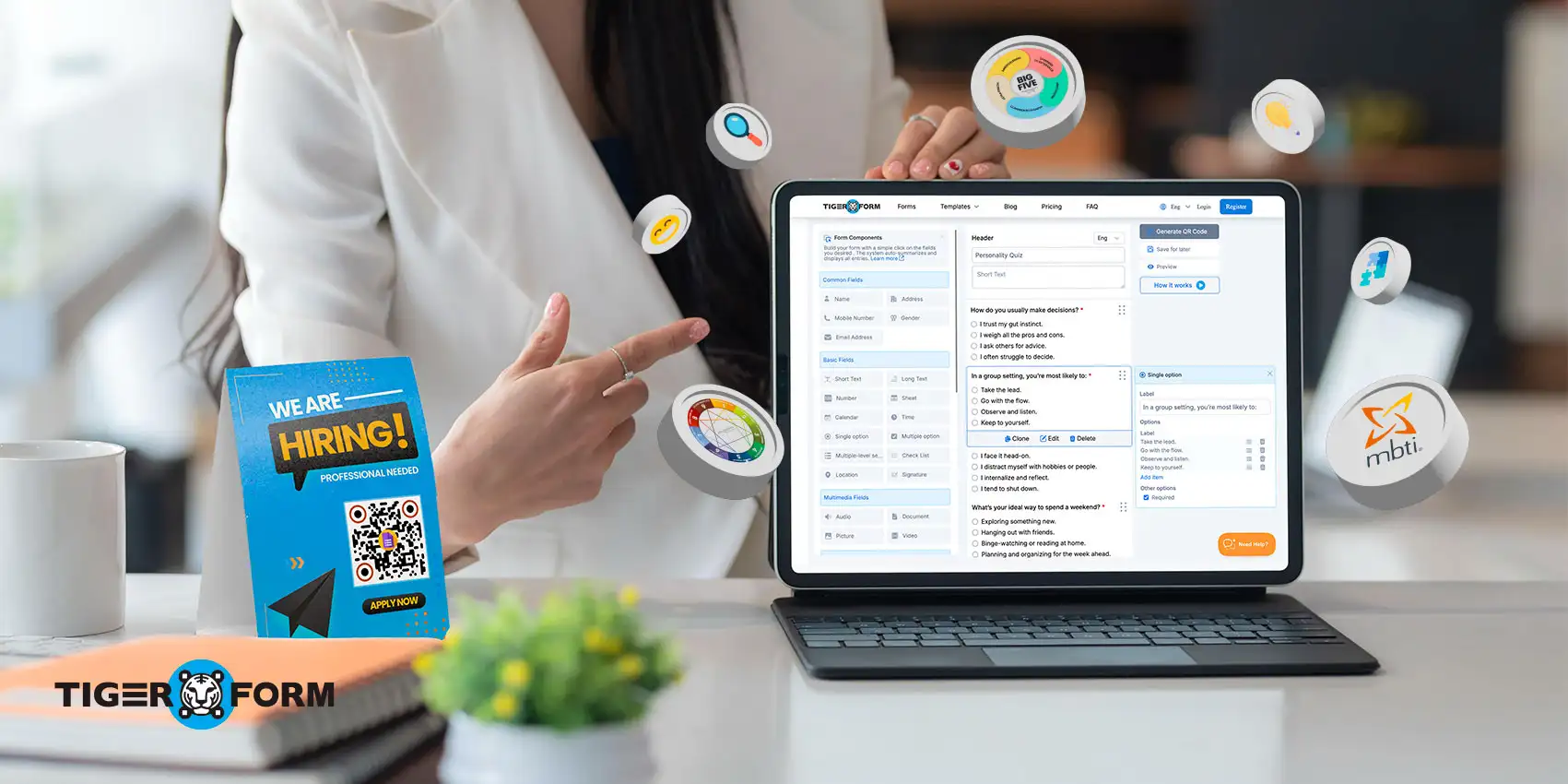
Personality quiz questions are designed to bring out the active, changing state of someone’s personality.
Because, getting to know someone isn’t just about names and backgrounds; it takes attention and willingness to understand their thoughts and feelings. And by understanding someone’s personality, you build a fluid but real connection.
To help you understand your colleagues or anyone you’re interested in getting to know, we’ve listed some personality questions that will help you see them in a deeper but fun way. Also, you’ll learn how to design your quiz easily using tools like a QR code form generator. Let’s get started!
Who can benefit from personality trait quizzes
While you cannot fully see a person’s character, understanding their personality brings a lot of value in business setups. Personality quizzes are more than icebreakers; even random questions can bring out honest reactions and give insight into someone’s personality.
Awareness from personality quizzes helps management make better decisions and strengthen client relationships. They dig deeper than first impressions and reveal how individuals think, decide, and collaborate.
They are structured tools that provide context for someone’s current preferences and tendencies without making rigid judgments. Test results aren’t just small but meaningful peek into an ongoing career narrative to make people-first decisions.
Employers
Personality quizzes in hiring go beyond resumes and interviews to show how a candidate’s traits fit the role and company culture. Research from Aberdeen Group found that companies using these assessments saw employee turnover drop by 40% (Psicosmart). Awareness on how candidates work, manage stress, and collaborate, employers can make smarter hires and keep talent longer.
Employees
The test results provide a roadmap for improving team dynamics.Understanding team collegues’ tendencies allows right match in individual strengths and create systems that address weaker traits. This targeted approach supports smoother workflows and reduces conflicts. Research published in the Journal of Personality and Social Psychology shows that people who understand personality traits improve their work performance and relationships by 50% (Psicosmart).
HR and training managers
HR and training managers can integrate personality quizzes into employee development programs. These insights help create a standard training that fits how people learn and what motivates them. A training system that hear and supports employees encourage them engage more and perform better.
Partners and clients
Understanding your partners’ and clients’ personalities can be a powerful edge; not to influence, but to improve communication, negotiation, and conflict resolution. As psychologist Karina Schumann, PhD, notes, empathy fosters behaviors that strengthen relationships. Used right, personality insights let companies anticipate what partners need, dodge misunderstandings, and develop truly trusting relationships
160 personality quiz questions to know someone

Fun and quirky preferences
Starting off with the lightest yet fun question type that reveals someone’s playful side and hidden humor. These questions help participants relax and open up, making the session fun and relatable. Use these as early questions, conversation starters, or icebreakers:
- Do you hit snooze or wake up on the first alarm?
- What’s your guilty pleasure?
- What’s your favorite kind of weather?
- Dogs, cats, neither, or others?
- What’s one item you always forget to pack?
- Do you believe in horoscopes?
- What’s your favorite holiday and why?
- Do you like surprises?
- What’s your go-to emoji?
- What food would it be if you could only eat one food for the rest of your life?
- What’s your go-to karaoke song?
- Do you believe in aliens?
- What’s the last song you listened to on repeat?
- What’s a weird food combination you secretly love?
- What’s your favorite form of procrastination?
- What’s the one app you couldn’t live without?
- What’s the most ridiculous thing you’ve ever bought?
- What’s your spirit animal?
- What’s a silly fear you have?
- What’s your go-to karaoke song, even if you can’t sing?
Personal favorites
Questions about favorites hint at someone’s taste, comfort zones, and deep connections. Answers to these may seem simple preferences, but they often lead to deeper patterns. These favorites are what calms, excites, and makes them feel seen. Add these to your questionnaires to gently surface emotional triggers and values. They are helpful in customer profiling, user research, or getting to know friends or colleagues on a personal level:
- What’s the best gift you’ve ever received?
- What’s your go-to comfort food?
- What’s a book you could read over and over again?
- What’s your all-time favorite movie?
- What’s a podcast or YouTube channel you can’t get enough of?
- What’s your favorite place you’ve ever traveled to?
- What’s your favorite song from your favorite music artist?
- What’s a TV show you’d recommend to everyone?
- Who is a celebrity or historical figure you admire and why?
- What’s a color you feel best represents you?
- What’s your favorite part of your everyday schedule?
- What’s your favorite app or website you use daily?
- What’s your favorite scent in a candle or perfume?
- What’s your favorite flower or plant?
- What’s your favorite thing about yourself (physical or personality-wise)?
- What’s your favorite fashion statement?
- What’s your favorite outfit combo?
- What’s your favorite way to relax after a long week?
- What’s your favorite thing about your current lifestyle?
- What’s your favorite childhood memory?
Lifestyle habits
These questions give answers that peek at how someone lives daily, from sleep schedules to social interactions. Lifestyle habits often reflect personality depths like conscientiousness, extraversion, or openness. These questions are ideal for behavior-based or compatibility assessments. Use them when trying to understand a person’s routine preferences in health or life instances:
- Are you an early bird or a night owl?
- What does your morning routine look like?
- How important is routine to you?
- How do you handle your to-do list?
- Do you usually cook your meals, order in, or eat out?
- How often do you try new things?
- How do you feel about spontaneity?
- What’s your preferred method of travel: road trip, plane, or train?
- What’s your typical level of physical activity in a week?
- Do you prefer a minimalist or maximalist lifestyle?
- Do you prefer city life or the countryside?
- How often do you check your phone?
- What’s your biggest pet peeve in daily life?
- How do you unwind after a long day?
- Do you work better in silence or with background noise?
- Are you a planner or a last-minute person?
- How often do you exercise?
- How much sleep do you need to feel okay?
- Do you clean a little each day or all at once?
- What’s your preferred way to spend a rainy day?
Decision-making habits
These questions gather answers that identify character traits when making choices or taking risks. Do they act on impulse, or do they weigh every option? That distinction says a lot about how they process situations and make judgments. These habits reflect traits like logic, intuition, assertiveness, or doubt. Use them for self-awareness exercises or leadership/team assessments:
- Are you more logical or emotional when deciding?
- Do you regret decisions easily?
- What’s the hardest decision you’ve ever made?
- How do you react when plans change at the last minute?
- Do you research before making a purchase?
- How do you prioritize when overwhelmed with options?
- What’s your biggest factor in decision-making: money, time, or happiness?
- Have you ever regretted not making a decision?
- How do you feel about commitment: straightforward or daunting?
- Are you more likely to seek advice from others or trust your own judgment?
- Are you a risk-taker or do you play it safe?
- When shopping, do you compare or choose the first thing that catches your eye?
- Do you find yourself second-guessing your choices after they’ve been made?
- Do you prefer leading or following in group decisions?
- Do you tend to overthink?
- Do you trust your instincts or make a pros and cons list??
- Do you change your mind often?
- How do you feel about making big life changes?
- Do you focus on short-term or long-term impact?
- Do you consider how others feel when you decide?
This or that preferences
These questions reveal a person’s gut instincts. Their choice shows how their mind organizes comfort, energy, and engagement. Answers to these questions reveal dominant traits without complex questioning. You can use these questions for fast-talk quizzes or icebreakers:
- Indoors or outdoors?
- City or countryside?
- Road trip or flying?
- Beach or mountains?
- Sunrise or sunset?
- Books or movies?
- Movies or series?
- Text, call, or voice message?
- Fantasy fiction or science fiction?
- Mall or online shopping?
- Sneakers or sandals?
- Sweet or savory?
- Coffee or tea?
- Truth or dare?
- Rainy days or sunny days?
- Handwritten letters or digital cards?
- Camping or a luxury hotel?
- Spontaneous or planned?
- Classes or self-learning?
- Solo travel or group travel?
Self-perception and values questions
These questions clarify how people see themselves and what they believe in. Self-perception ties to emotional intelligence and confidence, while value questions pinpoint moral standards and what someone stands for. These insights also help reveal someone’s personality type. You can use these questions for long, deep talks with someone, and ideally for coaching and team alignment.
- How do you define happiness?
- How do you define success?
- How important is honesty to you?
- Do you believe in second chances?
- Do you believe more in fate or effort?
- How would a close friend describe you?
- What do you value most in life and relationships?
- How do you recharge mentally?
- Do you find it easy to say no?
- What’s a personal belief or value that you will not compromise on?
- What’s your biggest strength, and what’s your biggest weakness?
- What’s a recent mistake you’ve learned from?
- Do you believe people can truly change?
- What’s a quality you admire most in others?
- How do you handle constructive criticism?
- What’s one thing you’re trying to get better at?
- What’s the most valuable piece of advice you’ve ever received?
- Do you find it easy to admit when you’re wrong?
- What’s a characteristic you believe you’ve inherited from a family member?
- Do you consider yourself an optimist, a pessimist, or a realist?
Aspirations and motivators
If you want to know someone’s driving force or dreams, use these personality quiz questions. Aspirations and motivators guide a person’s personality and will to achieve milestones. These questions are ideal for career planning, personal growth tools, or vision-setting sessions:
- What motivates you to get out of bed in the morning?
- Who or what inspires you most?
- What makes you feel most fulfilled?
- What does your dream life look like?
- What would you do if money weren’t a problem?
- What’s something you’ve always wanted to try?
- Do you enjoy being challenged?
- Can you handle pressure?
- What’s something that gives you purpose?
- What legacy would make you proud?
- What’s a long-term goal you’re currently working towards?
- Do you prefer a stable or daring life?
- What’s a bucket-list item you’ve checked off?
- What’s a cause you’re passionate about?
- What’s a skill you’d like to master in the next year?
- What does your ideal future look like in five years?
- What makes you feel most alive?
- Do you believe in chasing your dreams, even if they’re unrealistic?
- What’s something you’re saving up for right now?
- What’s one thing you would do if you knew you couldn’t fail?
Emotional traits
These questions show how someone typically deals with feelings. Whether they’re relaxed, quick to react, or more private with emotions, these habits affect how they handle relationships and pressure. These tendencies often connect to bigger traits, like how sensitive or easygoing someone is:
- What’s a feeling you find challenging to manage?
- How do you practice self-care?
- How do you console a sad friend?
- What’s your “tell” when you’re feeling a specific emotion?
- Do you consider yourself an optimist or a realist?
- When do you get angry?
- How do you handle anger?
- How do you deal with your feelings of jealousy?
- Do you cry easily?
- What’s your happiest memory?
- Are you quick to forgive or hold grudges?
- What’s your love language?
- Do you struggle with self-doubt?
- How do you deal with loneliness?
- Are you nostalgic or future-focused?
- What’s your emotional superpower?
- What’s something that always makes you smile?
- What triggers your stress most?
- Do you need time alone to process feelings?
- Do you get emotionally attached fast?
How to create a personality quiz form in minutes

Creating and distributing your personality quiz has never been easier, thanks to intuitive tools like QR code-integrated form generators. This method is not only efficient but visually engaging.
A QR code quiz eliminates barriers to participation, making it perfect for guest satisfaction surveys or social engagement campaigns. Whether for HR, customer engagement, or team bonding, you can develop your quiz in just a few steps:
1. Select a form builder
Sign up with a form tool like TIGER FORM to start creating your quiz form. In fact, they’re a new quiz feature on the way. It’s designed to make quiz forms easier and more fun to build.
2. Pick a template or start from scratch
Use pre-made templates to simplify design or start with a blank form.
3. Customize questions
Choose questions from categories above or curate your own personality quiz questions.
4. Add logic and scoring (if needed)
Decide if you want your personality assessment test to display results or insights.
5. Finalize and generate the QR code
Preview your form for finalization. After, create the QR code for your form.
6. Export to share
You can download the generated QR code and share it digitally via email or messaging apps. You can also print it out for physical distribution.
6. Track form performance
You can check the form scans and submissions for quantity, per location, and device. To see this feature, go to your form creator’s account dashboard.
Value personality assessment test to build solid interactions
Understanding personality doesn’t require deep psychological understanding or lengthy conversations. Sometimes, it only takes the right question. Whether you’re getting to know a colleague or even yourself, personality quiz questions are an opportunity to create meaningful connections.
The questions above, from light to deep ones, guide us to reveal someone’s personality gradually. And with modern tools like form QR codes, these questions become even more accessible and profound.
Next time you want to start a conversation or break the ice, ask a personality question and be surprised by what you learn from someone. Build your personality questionnaire now!
